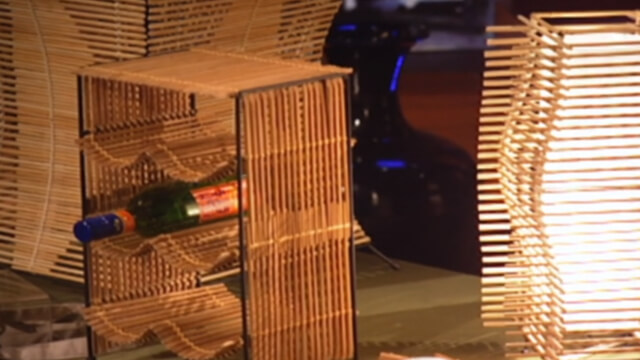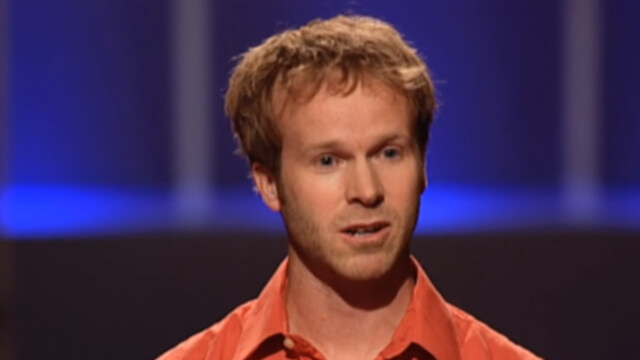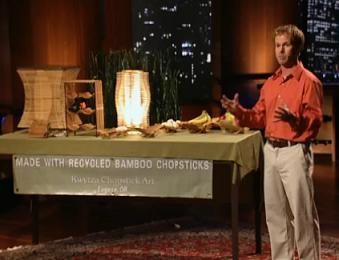Have you ever thought about the journey a pair of chopsticks might take after a delicious meal? For most, chopsticks end up discarded, forgotten in landfills. But for Brian Parks, these humble utensils hold a world of untapped potential. His innovative vision gave birth to Chopstick Art, a business dedicated to transforming recycled chopsticks into beautiful, sustainable home goods.
In an era where sustainability is more than a buzzword, Chopstick Art stands out. It cleverly combines eco-consciousness with creativity, offering products that are as functional as they are stylish. From baskets to trivets, each piece is a testament to the art of upcycling. But how did this idea fare in the high-stakes world of Shark Tank? Let’s explore the journey of Chopstick Art and its memorable pitch on the show.
Chopstick Art appeared in Shark Tank Season 12 and secured an investment from Kevin O’Leary.
Contents
ToggleChopstick Art Overview
Founded by Brian Parks, Chopstick Art is not just another home goods brand. It represents a shift towards sustainable living, proving that everyday items can be both eco-friendly and elegant. The concept is simple yet profound: take something as ordinary as used chopsticks and turn them into extraordinary home accessories.
Brian’s journey began with a keen eye for possibilities. He saw the potential in discarded chopsticks, envisioning them as unique, handcrafted items that could grace any home. His dedication to sustainability and craftsmanship quickly set Chopstick Art apart in the competitive market of home goods.
Chopstick Art’s products range from intricately woven baskets to sturdy trivets, each piece telling a story of transformation. The brand’s commitment to quality and sustainability resonates with consumers who are increasingly mindful of their environmental impact. By choosing Chopstick Art, customers are not only enhancing their living spaces but also supporting a greener planet.
Despite the challenges of running a niche business, Brian’s passion for sustainability and creativity has kept Chopstick Art thriving. The brand’s journey is a testament to the power of innovative thinking and the growing demand for products that prioritize both style and sustainability.
Chopstick Art Shark Tank Pitch: Did They Secure a Deal?
Brian Parks entered the Shark Tank seeking $100,000 in exchange for a 10% stake in Chopstick Art. His pitch was as unique as his products, capturing the attention of the Sharks with its blend of creativity and sustainability. He showcased his impressive sales figures, having generated $500,000 over five years, a notable achievement for a small business.
The Sharks were intrigued by the concept and the craftsmanship behind each piece. However, despite Brian’s compelling presentation, they ultimately decided not to invest. The consensus was that the business was too small for their investment portfolios. While the Sharks appreciated the artistry and sustainability of Chopstick Art, they felt it lacked the scalability they typically seek.
Though disappointed, Brian didn’t let the outcome deter him. He continued to build Chopstick Art, focusing on online sales and wholesale opportunities. Today, the business generates around $200,000 annually, proving that determination and a unique vision can sustain a business even without a Shark’s backing.
For those curious about the ongoing journey of Chopstick Art and other inspiring entrepreneurial stories, SharkWorth offers a wealth of information and updates. Brian’s experience on Shark Tank is a reminder that while not every pitch results in a deal, the exposure and feedback can be invaluable.
Chopstick Art Networth
When we talk about the net worth of Chopstick Art, it’s important to consider the unique nature of the business. Founded by Brian Parks, the company transforms discarded chopsticks into beautiful home goods. This innovative idea not only promotes sustainability but also offers stylish products that appeal to eco-conscious consumers.
Brian’s appearance on Shark Tank brought significant attention to Chopstick Art. Despite not securing a deal, the exposure helped boost sales and brand recognition. As of now, the company’s estimated net worth is around $1 million, based on its valuation during the show. This figure reflects both the potential of the business and its commitment to sustainability.
Chopstick Art’s net worth is largely driven by its unique product line and the growing demand for sustainable goods. The company generates an annual revenue of approximately $200,000 through online sales and wholesale partnerships. This steady income stream, combined with the brand’s innovative approach, contributes to its overall value.
While the business may not have reached the heights of some Shark Tank success stories, its net worth is a testament to Brian’s vision and dedication. By focusing on quality and sustainability, Chopstick Art continues to carve out a niche in the competitive home goods market.
Chopstick Art After Shark Tank
After appearing on Shark Tank, Chopstick Art faced the challenge of growing without the backing of a Shark. Brian Parks, however, remained undeterred. He focused on expanding his business through online platforms and wholesale opportunities, leveraging the exposure from the show to reach a wider audience.
The post-Shark Tank journey of Chopstick Art has been marked by steady growth. The company has maintained its commitment to sustainability, offering a range of products that appeal to environmentally conscious consumers. This focus has helped Chopstick Art establish a loyal customer base, contributing to its continued success.

One of the key strategies Brian employed was enhancing the online presence of Chopstick Art. By optimizing the website and utilizing social media, he was able to attract new customers and increase sales. This digital approach proved effective, as the company now generates around $200,000 in annual revenue.
Wholesale partnerships have also played a crucial role in Chopstick Art’s growth. By collaborating with retailers, Brian has been able to reach more customers and expand the brand’s footprint. These partnerships have not only increased sales but also strengthened the brand’s reputation in the sustainable goods market.
Despite the challenges of growing a niche business, Chopstick Art has thrived post-Shark Tank. The company’s journey highlights the importance of resilience and innovation in the face of adversity. Brian’s dedication to sustainability and quality continues to drive the brand’s success, ensuring a bright future for Chopstick Art.
Is Chopstick Art Still in Business?
Yes, Chopstick Art is very much still in business. The company continues to operate successfully, driven by Brian Parks’ passion for sustainability and creativity. Despite not securing a deal on Shark Tank, Chopstick Art has managed to carve out a niche in the competitive home goods market.
The business has maintained a steady revenue stream, generating around $200,000 annually through online sales and wholesale partnerships. This financial stability is a testament to the brand’s unique value proposition and the growing demand for sustainable products.
Chopstick Art’s ongoing success can be attributed to its commitment to quality and innovation. By transforming discarded chopsticks into stylish home goods, the company appeals to consumers who prioritize eco-friendly living. This dedication to sustainability has helped Chopstick Art build a loyal customer base and establish a strong presence in the market.
Brian Parks continues to lead the company with a focus on expanding its reach and product offerings. By exploring new markets and enhancing the brand’s online presence, Chopstick Art remains a relevant and thriving business. The company’s journey serves as an inspiring example of how passion and perseverance can lead to success, even without the backing of a Shark.
What’s Next For Chopstick Art
As Chopstick Art continues to grow, the future looks promising for this innovative brand. Brian Parks has demonstrated a knack for turning challenges into opportunities, and his dedication to sustainability remains unwavering. So, what can we expect next from Chopstick Art?
One potential avenue is expanding the product line. While baskets and trivets have been popular, there’s room for more creative uses of recycled chopsticks. Imagine a range of kitchen accessories, or even furniture pieces, all crafted from these humble utensils. By diversifying their offerings, Chopstick Art can attract a broader audience and keep the brand fresh and exciting.

Another focus area could be enhancing the brand’s online presence. With more consumers shopping online, having a robust digital strategy is crucial. This could involve optimizing the website for better user experience, engaging storytelling through social media, and possibly venturing into online marketplaces. Such efforts can increase visibility and drive sales, reaching eco-conscious customers worldwide.
Collaborations and partnerships are also on the horizon. By teaming up with like-minded brands or influencers, Chopstick Art can tap into new markets and audiences. These collaborations could lead to exclusive product lines or limited edition releases, generating buzz and excitement around the brand.
Lastly, Chopstick Art might explore educational initiatives. By hosting workshops or seminars on sustainability and upcycling, the brand can position itself as a thought leader in the eco-friendly space. These events could inspire others to think creatively about sustainability, further solidifying Chopstick Art’s reputation as a pioneer in this field.
With these strategies, Chopstick Art is poised to continue its journey of growth and innovation. Brian’s vision for a sustainable future remains at the heart of the brand, ensuring that every step forward aligns with its core values.
Chopstick Art’s Products and Services
Chopstick Art offers a unique range of products that blend functionality with sustainability. At its core, the brand transforms discarded chopsticks into beautiful home goods, making eco-conscious living accessible and stylish.
The product lineup includes intricately woven baskets, perfect for storage or decorative purposes. These baskets showcase the craftsmanship and attention to detail that Chopstick Art is known for. Each piece is a testament to the art of upcycling, turning waste into something wonderful.
Trivets are another popular item, providing a practical yet elegant solution for protecting surfaces from hot dishes. Made from recycled chopsticks, these trivets are sturdy and durable, making them a must-have for any eco-friendly kitchen.
Beyond these staples, Chopstick Art is continually exploring new product ideas. The potential for innovation is vast, with possibilities ranging from kitchen utensils to larger home accessories. Each new product reflects the brand’s commitment to quality and sustainability, ensuring that customers receive items that are both beautiful and environmentally responsible.
In addition to products, Chopstick Art offers services that align with its mission. Custom orders are available, allowing customers to request specific designs or sizes. This personalized approach ensures that every piece fits perfectly into the customer’s home, adding a unique touch to their decor.
Wholesale partnerships are another key aspect of Chopstick Art’s business model. By collaborating with retailers, the brand can reach a wider audience and promote sustainable living on a larger scale. These partnerships are mutually beneficial, enhancing the brand’s visibility while providing retailers with unique, eco-friendly products.
Chopstick Art’s dedication to sustainability and innovation sets it apart in the home goods market. By offering products and services that prioritize the environment, the brand continues to inspire and delight customers worldwide.
FAQ’s
What Are the Latest Updates About Chopstick Art Shark Tank?
Chopstick Art continues to thrive, generating around $200,000 annually through online sales and wholesale partnerships. Despite not securing a deal on Shark Tank, the brand has maintained a steady growth trajectory. Brian Parks, the founder, focuses on expanding product lines and enhancing online presence to reach eco-conscious consumers worldwide.
Did Chopstick Art Get a Deal on Shark Tank?
No, Chopstick Art did not secure a deal on Shark Tank. Although Brian Parks presented a compelling pitch, the Sharks decided not to invest. They felt the business was too small for their portfolios, despite its unique concept and impressive sales figures.
What Happened to Chopstick Art Shark Tank?
After appearing on Shark Tank, Chopstick Art did not receive an investment but gained significant exposure. Brian Parks leveraged this to grow the business through online sales and wholesale opportunities. The company continues to operate successfully, focusing on sustainability and innovative product offerings.
Who Owns Chopstick Art?
Chopstick Art is owned by Brian Parks. He founded the company with a vision to transform discarded chopsticks into beautiful, sustainable home goods. His dedication to eco-friendly practices and creativity drives the brand’s success.
Is Chopstick Art Successful Now?
Yes, Chopstick Art is successful, generating around $200,000 annually. The brand has established a loyal customer base by offering unique, sustainable products. Its commitment to quality and innovation has helped it carve out a niche in the competitive home goods market.
What We Know About The Founder?
Brian Parks is the founder of Chopstick Art. He has a passion for sustainability and creativity, which led him to create a business that transforms recycled chopsticks into stylish home goods. His vision and dedication have been key to the company’s growth and success.







